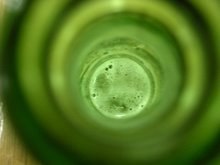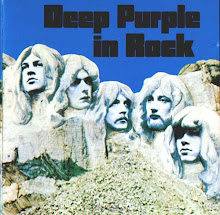This is the rather technical follow-up to my previous post. Non-lawyers may find it somewhat arid. My apologies. This is intended mainly for my mucker (and habitual disputant) The British Cowboy.
The regulations I mentioned earlier in my discussion of the (spurious) "Jack Daniel's is not a bourbon" argument were first drawn up by Congress in 1964 and are promulgated today by the US Bureau of Alcohol, Tobacco, and Firearms. A full text is available online here.
The key section on the definition of 'bourbon' is Sub-part C, para. 5.22 (b) (1).
However, some slight confusion is potentially sown by the subsequent para. 5.22 (b) (2):
(2) "Whisky distilled from bourbon (rye, wheat, malt, or rye malt) mash" is whisky produced in the United States at not exceeding 160°proof from a fermented mash of not less than 51 percent corn, rye, wheat, malted barley, or malted rye grain, respectively, and stored in used oak containers; and also includes mixtures of such whiskies of the same type. Whisky conforming to the standard of identity for corn whisky must be designated corn whisky.
First of all, unless it's a usage that has somehow become standardized in American conventions of drafting, the listing of "rye, wheat, malt, or rye malt" in brackets would suggest - in regular English - that they are all varieties of bourbon (whereas, in fact, they are presumably intended as a list of mutually exclusive alternatives to bourbon). This would appear to be very clumsy drafting.
Then we have the utter bizarreness of this phrase "whisky distilled from bourbon" (and yes, they do spell it whisky, not whiskey, throughout these regulations - that could provoke a whole new pedantfest!). How is this different from bourbon (and the other varieties of whiskey) defined in the preceding sub-paragraph? And has anyone ever heard this phrase used in the distilling industry? Are these provisions only applicable to drinks which have undergone a second distillation? The only essential difference between this sub-paragraph and the one preceding seems to be the provision about "used barrels".
And to cap it all, we have that final sentence about 'corn whisky', seemingly thrown in as an afterthought, a propos of nothing.
I had wondered if perhaps the preceding sub-paragraph might allow some whiskey the option of declaring itself to be either a 'bourbon' or a 'corn whiskey', and that this odd final sentence might be attempting to refer back to this, to close that 'loophole' (if so, it is plainly in the wrong place, and another example of bad drafting; but in fact, there does not appear to be any such loophole anyway). In 5.22 (b) (1) (i) 'bourbon whisky' is defined (amongst other things) as being produced "from a fermented mash of not less than 51 percent corn"; 5.22 (b) (1) (ii) defines 'corn whisky' as being produced "from a fermented mash of not less than 80 percent corn". No upper limit for corn mash content is prescribed in the 'bourbon' definition, but the 80% threshold might seem to bring a whiskey into the category of 'corn whisky' instead. However, (b) (1) (ii) further defines 'corn whisky' as being produced in uncharred barrels, whereas (b) (1) (i) stipulates that 'bourbon' is made in charred barrels.
I have seen some of the online "Jack Daniel's is not a bourbon" lobbyists claim that Jack is made from slightly over 80% corn mash. Does this mean that it is a 'corn whisky/whiskey', not a 'bourbon'? Well, NO - because it is made in charred barrels. There is no upper limit for corn mash content for whiskeys matured in charred barrels: over 50%, they're all bourbons. I have seen others of these lobbyists claim (though they do not attempt any connection between these two arguments) that Jack is not a bourbon because it is matured in used barrels. I don't think this is true, but that still wouldn't bring it within the definition of 'corn whisky', I don't think: (b) (1) (ii) might possibly be interpreted as allowing the use of charred, used barrels (the phrase is "used or uncharred new oak containers"), although this would be a pretty bizarre variation in the provisions; and it is, I would suggest, precluded by the subsequent clause "and not subjected in any manner to treatment with charred wood". If you can't have charred wood in your new barrels, then you can't have it in used barrels either. So, Jack Daniel's is definitively not a 'corn whiskey'. Sorry.
If their maturation process does employ used barrels (and I'm pretty sure it doesn't), then it would seem to fall under the rather odd-sounding (b) (2) definition of a "whisky distilled from bourbon (mash)" rather than simply a "bourbon". But that's still a kind of bourbon, surely?
Now, those Tennessean blow-hards are probably not going to accept the legal definition as being decisive (because for them it's not about logic or practicality, it's purely about scorning their Kentucky neighbours)..... but I'm afraid I really can't see any room for doubt that under US law Jack Daniel's is a bourbon.
Footnote to the footnote: The British Cowboy points out below that I seem to have overlooked the word 'mash' included at the opening of that puzzling sub-para. 5.22 (b) (2). Yes, indeed, I had a complete blindspot about it - despite having read the turgid text through quite a number of times! I have to withdraw most of what I said about the drafting in that particular instance: it is acceptable drafting - not incompetent, incomprehensible, or contrary to the intended meaning, as I had suggested. It is, however, still dashed inelegant. And a very obscure piece of English. I have no more idea what "whisky distilled from bourbon mash" is supposed to be than I do what "whisky distilled from bourbon" might have been.






3 comments:
Paul, I think you have missed a key word...
"(2) "Whisky distilled from bourbon (rye, wheat, malt, or rye malt) mash" is whiskyproduced in the United States at not exceeding 160°proof from a fermentedmash of not less than 51 percent corn, rye, wheat, malted barley, or malted ryegrain, respectively, and stored in used oak containers; and also includes mixturesof such whiskies of the same type. Whisky conforming to the standard of identity for corn whisky must be designated corn whisky."
This is a very different thing to what you read it as, in your comments...
"First of all, unless it's a usage that has somehow become standardized in American conventions of drafting, the listing of "rye, wheat, malt, or rye malt" in brackets would suggest - in regular English - that they are all varieties of bourbon (whereas, in fact, they are presumably intended as a list of mutually exclusive alternatives to bourbon). This would appear to be very clumsy drafting.
Then we have the utter bizarreness of this phrase "whisky distilled from bourbon" (and yes, they do spell it whisky, not whiskey, throughout these regulations - that could provoke a whole new pedantfest!). How is this different from bourbon (and the other varieties of whiskey) defined in the preceding sub-paragraph?"
It isn't whisky distilled from bourbon. It is whisky distilled from bourbon MASH. Hence the parenthetical after bourbon... "rye, wheat, malt, or rye malt"... can be read as referring to alternatives. It refers to alternative types of mash. It is clumsy construction, but you have to include the word mash for it to make sense.
Yep, good point.
But it is still horrible drafting.
And I have never come across any reference anywhere to "bourbon mash" & co.
And surely all mash is fermented.... otherwise, how does it make alcohol??
I don't think this is a get-out for you Tennesseeans, allowing you to suppose that 'fermented mash' means a previously used 'sour mash', and that anything made from such a mash can only be called a 'whisky' and nothing more specific.
We agreed that most American whiskies are made with a 'sour mash' process - whether they be bourbon, rye, or 'other'.
So, whatever this horrible clause is trying to define, it ain't sour mash whiskies.
And please don't call me Shirley.
Post a Comment